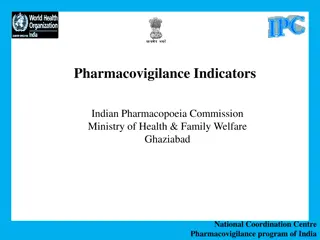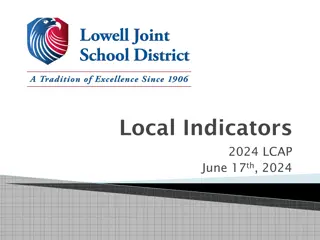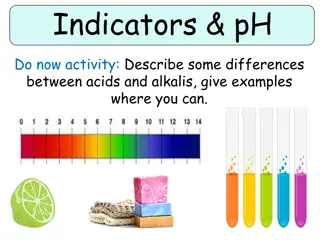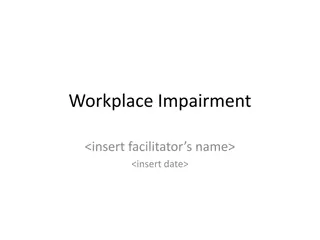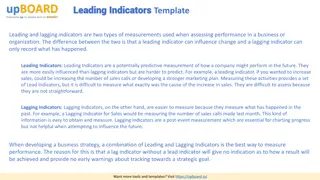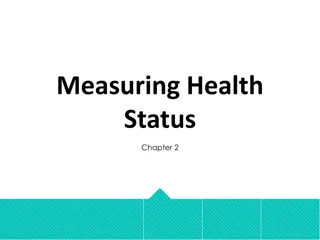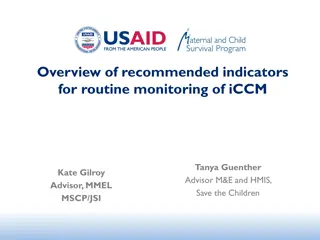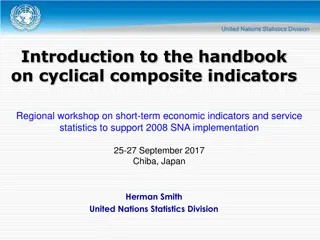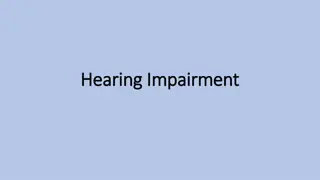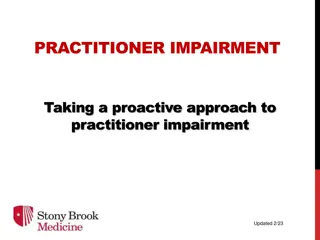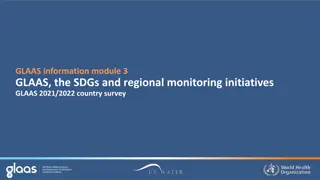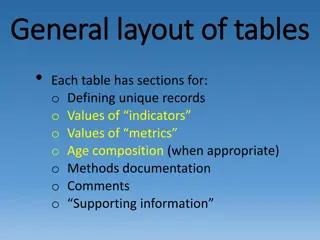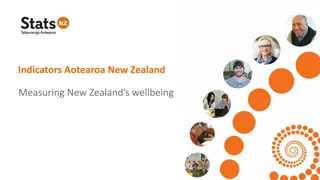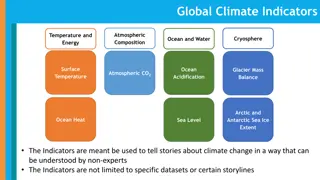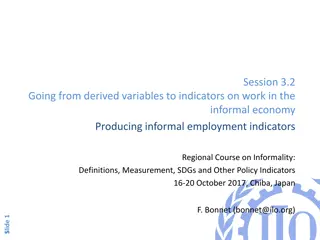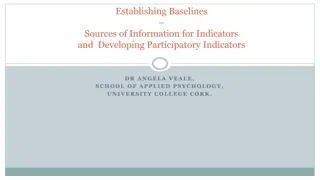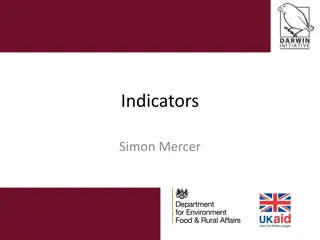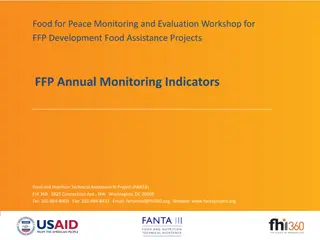Understanding Impact Indicators in Monitoring and Evaluation
Impact indicators play a crucial role in monitoring and evaluating activities, projects, or programs. Direct indicators directly measure results, while indirect indicators are used when direct measures are not feasible. Quantitative indicators are expressed numerically, while qualitative indicators
3 views • 4 slides
Pharmacovigilance Indicators for Monitoring Health Interventions in India
The pharmacovigilance indicators outlined by the Indian Pharmacopoeia Commission focus on evaluating the status of pharmacovigilance systems in India. These indicators help measure the effectiveness of health services and interventions, identify strengths and weaknesses, and determine the impact and
2 views • 14 slides
Ensuring Local Indicators Compliance in California's Education System
The document outlines the required local indicators for LCFF priorities in California schools, emphasizing basics like teachers and facilities, academic standards implementation, and parent engagement. It also touches on school climate, course of study, and the criteria for LEAs/charters to be rated
2 views • 7 slides
Curriculum Framework for Children and Young People with Vision Impairment: Habilitation - Orientation and Mobility
The Curriculum Framework for Children and Young People with Vision Impairment focuses on Habilitation: Orientation and Mobility, providing training objectives, partner organizations, and information on teaching individuals with vision impairment to navigate their surroundings safely. The resource of
0 views • 21 slides
Understanding Indicators and Standards in Environmental Management
Exploring the concept of indicators and standards in environmental management, this content delves into their definition, selection process, sources, and importance. Indicators are crucial variables used to track changes caused by human activities, aiding in assessing progress towards desired condit
1 views • 27 slides
Understanding Acids and Alkalis: pH Scale and Indicators
Explore the differences between acids and alkalis, learn about indicators, pH scale, and how to categorize solutions as acidic, alkaline, or neutral. Understand the importance of universal indicators in determining acid and alkali strength. Discover the disadvantages of using red and blue litmus pap
3 views • 11 slides
Habilitation: Independent Living Skills Training Resource for Children and Young People with Vision Impairment
The Curriculum Framework for Children and Young People with Vision Impairment (CFVI) provides core training resources focusing on Area 6 - Habilitation: Independent Living Skills (ILS). This resource aims to introduce the concept of habilitation, explore barriers to inclusion, and offer intervention
0 views • 20 slides
Understanding the Effects of Drug Combinations in ARIDE Session 7
Dive into Session 7 of the ARIDE program to explore the prevalence of drug and alcohol use, the concept of polydrug impairment, and the potential effects of combining different substances. Learn about null effects, overlapping effects, and how various drug combinations can impact impairment indicato
0 views • 18 slides
Understanding Indicators in Strategic Planning and Information Management
Explore the importance of indicators in monitoring and evaluation, learn about different types of indicators such as baseline, output, and outcome. Discover the qualities of a good indicator and the various forms they can take, from direct to qualitative and standardized global indicators versus loc
2 views • 19 slides
Understanding Impairment of Assets in IFRS for SMEs - 2019
This content discusses the Impairment of Assets in IFRS for SMEs, focusing on determining the true economic benefits of assets for accurate financial representation. It covers exceptions, impairment tests, inventory valuation, and recognizing valuation/impairment losses for inventory categories. A c
1 views • 23 slides
Communicating with Patients with Cognitive Impairment and Other Communication Difficulties
This presentation highlights the causes of communication difficulties in patients, focusing on cognitive impairment, sensory impairments, and language barriers. It emphasizes the challenges of caring for these patients, including assessing pain and managing symptoms effectively. Practical strategies
0 views • 27 slides
Understanding IFRS 9 Financial Instruments & Impairment: Key Principles and Impact
Explore the key principles of IFRS 9 Financial Instruments, focusing on classification, measurement, impairment, and expected credit loss overview. Gain insights into the impact on financial statements across different stages, accounting for modifications, and identifying impairment in various finan
0 views • 12 slides
Workplace Impairment Awareness Training
Explore the concept of workplace impairment, its impact, and ways to address it in this informative presentation. Topics include identifying impairment, understanding its implications, supporting employees, and promoting a safe work environment. Engage in discussions on how impairment can affect job
0 views • 23 slides
Understanding Leading and Lagging Indicators in Business
Leading and lagging indicators play crucial roles in assessing the performance of a business or organization. Leading indicators are predictive, influencing future outcomes, while lagging indicators record past events. A strategic combination of both types is essential for measuring performance effe
1 views • 4 slides
Understanding Health Status Indicators and Measurements
Health status indicators play a crucial role in assessing overall health status at individual, group, and population levels. These measurements, such as self-assessed health status and life expectancy, provide valuable insights for governments to identify trends, enact appropriate interventions, and
2 views • 18 slides
Updates and New Indicators in 2024 Global AIDS Monitoring Reports
Updates in the 2024 Global AIDS Monitoring reports include new indicators related to gender equality, human rights, and stigma elimination, changes to existing indicators, and terminology updates. Four new indicators focus on gender responsiveness of HIV services, discriminatory attitudes in health
0 views • 21 slides
Overview of Recommended Indicators for Routine Monitoring of iCCM
Process to review and refine iCCM indicators for routine monitoring initiated by the M&E sub-group of the global CCM Task Force. The group developed a list of 10 indicators in 6 domains, including Human Resources, Referrals, Service Delivery, Reporting, Supply Chain, and Clinical Coaching. These ind
0 views • 11 slides
Understanding the Epidemiology of Disability and Its Impact on Health
Epidemiology focuses on studying disease causes, prevention, and control. Impairment, disability, and handicap are defined by the WHO. Impairment refers to loss or abnormality of function, disability refers to limitations in normal activities due to impairment, and handicap indicates social disadvan
0 views • 31 slides
Developing Proxy Indicators for Farm Profitability in Irish Agriculture
This study by Ciara O'Donovan focuses on developing and testing proxy indicators of farm profitability and efficiency measurements for knowledge transfer use on Irish farms. The research aims to identify indicators of farm performance, tailor them based on enterprise, scale, and seasonality, and tes
0 views • 20 slides
Handbook on Cyclical Composite Indicators Overview
This content provides insights into cyclical composite indicators, their objectives, features, and importance in economic analysis. It emphasizes the need for harmonized principles and standards in compiling these indicators for better international comparisons and economic assessments. The handbook
0 views • 23 slides
Early Warning Indicators for Pine Island Glacier in West Antarctica
The study examines the tipping points and early warning indicators for Pine Island Glacier in West Antarctica, a key contributor to sea-level rise. Through an advanced ice flow model, the research reveals three tipping points and their associations with ocean warming. The findings also introduce ear
0 views • 8 slides
Understanding Physician Impairment Due to Substance Use Disorders
Physician impairment due to substance use disorders can severely impact patient safety and clinical outcomes. This article explores the definition, causes, warning signs, assessment, treatment, and return to practice protocols for impaired physicians. Substance abuse in physicians can lead to behavi
0 views • 50 slides
Understanding Hearing Impairment and Its Impact on Education
Hearing impairment, whether permanent or fluctuating, can adversely affect a child's educational performance. In the educational context, terms like deafness, hard of hearing, and hearing loss are used instead of hearing impairment. Eligibility criteria for special education services under IDEA requ
0 views • 11 slides
Understanding Physician Impairment and Addiction Risks
Physician impairment due to mental illness, physical conditions, or substance abuse is a serious concern in the medical field. This article discusses the definition of impairment, signs of professional misconduct, and statistics related to substance use disorders among physicians. It emphasizes the
0 views • 21 slides
Workshop on Supporting Blind and Partially Sighted Students in Post-16 Education
This workshop aims to address barriers faced by students with vision impairment, focusing on necessary skills for post-college life and available support for positive transitions. Topics covered include curriculum framework, maximizing educational opportunities, transitioning to future endeavors, an
0 views • 23 slides
Understanding Energy Indicators and Their Significance in Environmental Analysis
Exploring the importance of energy indicators in environmental analysis, this content delves into various types of indicators, such as econometric, physical, and efficiency indicators. It highlights the need for clear objectives in measurement and coherence between energy aspects and activities. Add
0 views • 18 slides
Comprehensive Overview of GLAAS, SDG Monitoring, and Goal 6 Indicators
The content delves into the Global Analysis and Assessment of Sanitation and Drinking-Water (GLAAS), its relationship with the Sustainable Development Goals (SDGs), particularly Goal 6 on clean water and sanitation. It discusses regional monitoring initiatives, the 2030 Agenda for Sustainable Develo
0 views • 16 slides
Challenges and Opportunities in Science and Technology Policy Indicators
Towards creating indicators for the field of science and technology policy, this content discusses the increasing demands in research management and evaluation, the potential role of indicators in decision-making, the drawbacks of conventional indicators, and the current issues with the usage of sci
0 views • 44 slides
Understanding Impairment of Assets in Financial Management
Entities must periodically test for impairment to ensure assets are not overstated. An impairment loss occurs when an asset's carrying amount exceeds its recoverable amount. Assets like inventories and deferred tax assets may require testing. Learn when to undertake impairment tests, key indicators,
0 views • 19 slides
Table Layout Guidelines for Data Presentation
Comprehensive guidelines for structuring tables including defining unique records, values of indicators and metrics, age composition, methods documentation, comments, and supporting information. The content outlines the table layouts for values of indicators, metrics, NOSA table indicators and metri
0 views • 26 slides
Enhancing Wellbeing: Indicators Aotearoa New Zealand
Indicators Aotearoa New Zealand aims to measure and improve the wellbeing of New Zealanders by tracking environmental, social, and economic progress. The indicators incorporate Māori perspectives and will monitor current and future generations' wellbeing impact. Stakeholders can provide input throu
0 views • 7 slides
Understanding Global Climate Change Indicators
Explore various indicators related to global climate change, including atmospheric composition, temperature, cryosphere, ocean conditions, and extreme weather events. The indicators cover a wide range of topics such as glacier mass balance, ocean acidification, heavy precipitation, droughts, and hea
0 views • 8 slides
Understanding Informal Employment Indicators and Their Use in Policy Making
This session focuses on producing indicators related to informal employment and the informal sector, derived from labor force surveys. It covers key indicators on the extent and composition of informal employment, including identifying priority actions for specific groups. The session also discusses
0 views • 36 slides
Developing Participatory Indicators for Program Evaluation
Sessions led by Dr. Angela Veale aim to establish baselines, identify indicators, and reflect on evaluation practices in psychosocial program evaluations. Understanding indicators at output, outcome, and impact levels is crucial for measuring project success. The process involves defining indicators
0 views • 33 slides
The Role of Occupational Therapists in Establishing Evidentiary Foundation for Catastrophic Impairment Claims
Exploring the pivotal role of occupational therapists in creating a solid evidentiary foundation for catastrophic impairment claims, this content delves into a case study involving Mrs. Mujku, highlighting the significance of proper assessments and expert opinions. The narrative showcases the challe
0 views • 15 slides
Understanding Indicators in Monitoring and Evaluation
Indicators play a crucial role in monitoring and evaluation by providing signals of progress and success. They measure change, outcomes, and achievements of projects or programs. Different types of indicators exist, such as quantitative, performance, achievement, and accountability indicators. It is
0 views • 12 slides
Comprehensive Overview of FFP Annual Monitoring Indicators
Delve into the significance of annual monitoring, different categories and types of indicators, and the indicator revision process for the Food for Peace (FFP) program. Explore how to collect data, understand required indicators, and distinguish between output and outcome indicators.
0 views • 44 slides
Stakeholder Engagement in SPP/APR Meeting Results and Indicators
Stakeholder Meeting #2 discussed indicators 1, 2, 14, and 17 on July 27, 2021. The meeting highlighted new requirements for stakeholder involvement in the State Performance Plan/Annual Performance Report (SPP/APR) starting February 1, 2022. It emphasized expanding and documenting stakeholder engagem
0 views • 23 slides
Understanding Food for Peace Indicators and Evaluation Surveys
This content provides an overview of Food for Peace (FFP) indicators for baseline and final evaluation surveys, with insights on collecting and analyzing data related to key indicators such as household food access, nutrition status, WASH, agriculture, poverty, gender, and family planning. It discus
0 views • 14 slides
Sustainable Development Indicators for Belgium: Progress Towards the SDGs
Belgium's progress on sustainable development indicators towards the Sustainable Development Goals (SDGs) is tracked through a set of global and national indicators. Key updates in the 2024 report include new indicators on child poverty and digital skills, along with revised definitions for capital
0 views • 16 slides

